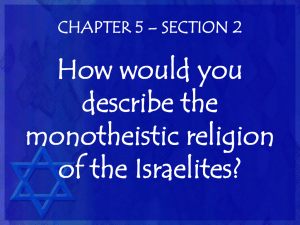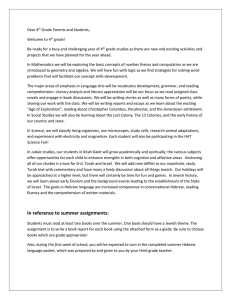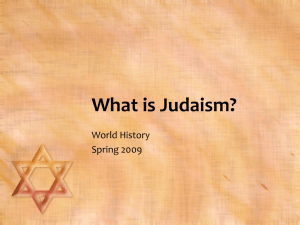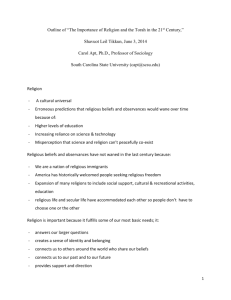195'}j Jonathan D. Sarna
advertisement
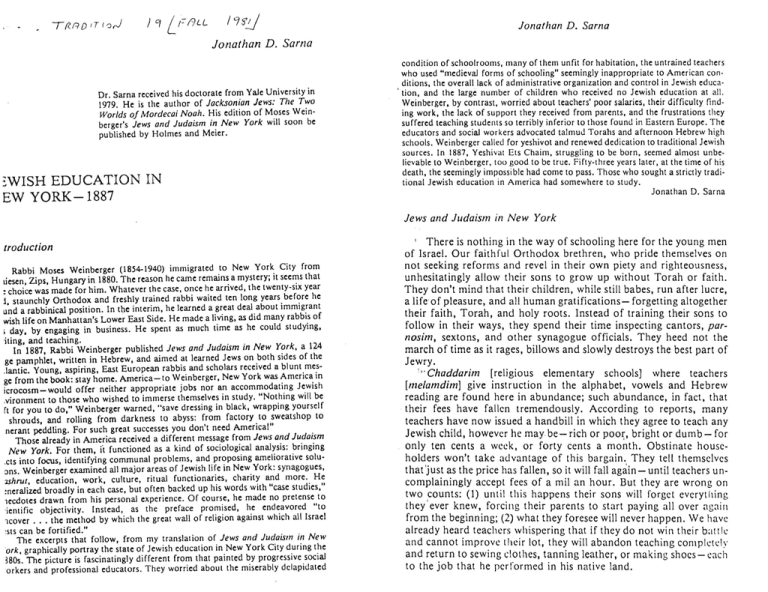
) CJ [FALL 195'}j Jonathan D. Sarna Jonathan D. Sarna Dr. Sarna received his doctorate from Yale University in 1979. He is the author of Jacksonian Jews: The Two Worlds of Mordecai Noah. His edition of Moses Weinberger's Jews and Judaism in New York will soon be published by Holmes and Meier. ::WISH EDUCATION IN EW YORK-I887 condition of schoolrooms, many of them unfit for habitation, the untrained teachers who used "medieval forms of schooling" seemingly inappropriate to American conditions, the overall lack of administrative organization and control in Jewish educa· , tion, and the large number of children who received no Jewish education at all. Weinberger, by contrast, worried about teachers' poor salaries, their difficulty finding work, the lack of support they received from parents, and the frustrations they suffered teaching students so terribly inferior to those found in Eastern Europe. The educators and social workers advocated talmuli Torahs and afternoon Hebrew high schools. Weinberger callet! for yeshivot and renewed dedication to traditional Jewish sources. In 1887, Yeshivat Ets Chaim, struggling to be born. seemed almost unbelievable to Weinberger. too good to be true. Fifty-three years later, at the time of his death, the seemingly impossible had come to pass. Those who sought a strictly traditional Jewish education in America had somewhere to study. Jonathan D. Sarna Jews and Judaism in New York troduction Rabbi Moses Weinberger (1854-1940) immigrated to New York City from uesen, Zips, Hungary in 1880. The reason he came remai~ a mystery; it see,:,s that : choice was made for him. Whatever the case, once he arnved, the twenty-sIX year 1, staunchly Orthodox and freshly trained rabbi waited ten long years. bef~re he und a rabbirlical position. In the interim, he learned a great deal about Immlg:ant wish life on Manhattan's Lower East Side. He made a living, as did many rabbis of ; day, by engaging in business. He spent as much time as he could studying, iting, and teaching. In 1887, Rabbi Weinberger published Jews and Judaism in New Y?rk, a 124 ge pamphlet, written in Hebrew, and aimed at learned Jews on both Sides of the :lantic_ Young, aspiring, East European rabbis and scholars received a blunt .me~­ ge from the book: stay home. America- to Weinberger, New York was ~mertca. In icrocosm-would offer neither appropriate jobs nor an accommodating Jewish ,vironment to those who wished to immerse themselves in study. "Nothing will be ft for you to do," Weinberger warned, "save dressing in black, wrapping yourself shrouds, and rolling from darkness to abyss: from factory to sweatshop to nerant peddling. For such great successes you don't need Americal" . Those already in America received a different message from Jews and Judaism New York. For them, ft functioned as a kind of sociological analysis: bringing .cts into focus, identifying communal problems, and proposing ameliorative solu::ms. Weinberger exarrlined all major areas of Jewish life in New York: synagogues, 2.Shrul, education, work, culture, ritual functionaries, charity and more. He :neralized broadly in each case, but often backed up his words with "case studies," 1tedotes drawn from his personal experience. Of course, he made no pretense to 'ientific objectivity. Instead, as the preface promised, he endeavored "to 1Cover ... the method by which the great wall of religion against which all Israel :sts can be foni fied." The excerpts that follow, from my translation of Jews and Judaism in New ork, graphically portray the state of Jewish education in New York City during the ~80s. The picture is fascinatingly di fferent from that painted by progressive social orkers and professional educators. They worried about the miserably dclapidated , There is nothing in the way of schooling here for the young men of Israel. Our faithful Orthodox brethren, who pride themselves On not seeking reforms and revel in their own piety and righteousness, unhesitatingly allow their sons to grow up without Torah or faith. They don't mind that their children, while still babes, run after lucre, a life of pleasure, and all human gratifications- forgetting altogether their faith, Torah, and holy roots. Instead of training their sons to follow in their ways, they spend their time inspecting cantors, parnosim, sextons, and other synagogue officials. They heed not the march of time as it rages, billows and slowly destroys the best part of Jewry. :,. Chaddarim [religious elementary schools] where teachers [melamdim] give instruction in the alphabet, vowels and Hebrew reading are found here in abundance; such abundance, in fact, that . their fees have fallen tremendously. According to reports, many teachers have now issued a handbill in which they agree to teach any Jewish child, however he may be- rich or poo~, bright or dumb - for only ten cents a week, or forty cents a month. Obstinate householders won't take advantage of this bargain. They tell themselves that 'just as the price has fallen, so it will fall again - until teachers uncomplainingly accept fees of a mil an hour. But they are wrong on two ,c ounts: (1) until this happens their sons will forget everything they ever knew, forcing their parents to start paying all over again from the beginning; (2) what they foresee will never happen. We have already heard teachers whispering that if they do not win their battk and cannot improve their lot, they will abandon teaching complete!y and return to sewing clothes, tanning leather, or making shoes- each to the job that he performed in his native land. Jonatlian U. :Jarna I More advanced teachers [morim] with wisdom and learning are also found here in abundance, and many of them are wonderfully skillful, highly trained pedagogues. But in the absence of schools and in the absence of any desire on the part of many of our brethren to rear their sons on "the knees" of Torah, they have trouble finding steady work. After a few years shuff1ing about as if in a world of desolation, most of them give up and return shamefacedly to their homelands. The lucky ones, who successfully make their way after a great deal of grief and travail into the homes of our wealthier brethren and are handed their sons, find it impossible to use their knowledge. They must rather wrack their brains to recall what they studied in their childhood from primary teachers. For during ' the period when, in our native lands, they taught Jewish children Torah from beginning to end, they must teach the sagacious children here the Hebrew alphabet, from a/efto lof. And during the time when the Hungarian or Polish Jewish youngster was brought to a level where he could understand the prophets, and listen to rigorous biblical and legal studies, the American youngster is · merely brought to the magnificent level of being able to stammer a few words of Englishstyle Hebrew, to pronounce the blessing over the Torah, and to chant half the maflir [the weekly prophetic portion) from a text with vowels and notes on the day he turns thirteen-a day which is celebrated here as the greatest of holidays among our Jewish brethren. From that day onward a youngster considers his teacher to be an unwanted article. On the very day of the celebration- the day when his father stops assuming responsibility for his sins-an angel comes, slaps him on the mouth and, [just as happens, according to legend, at birth) he forgets all the Torah that he has learned, including the blessings, the maflir, and, of course the phylacteries. In their place, he must learn to establish for himself a goal in life, and to become familiar with the ways of the world. The teacher is thus unnecessary. And since the parents come from Poland, and "know" that this wisdom does not require the servic.e of a trained and learned pedagogue, they have no U5e for the teacher, no matter what his quality. They pay, therefore, only according to their own estimate of what his work is worth- an amount generally so small that one cannot possibly live on it. Teaching has thus become a scorned and debased profession. It does not support those engaged in it and none will choose it save a man who, having tried his hand at all else, finally senses that his lucky star has gone black and that he is fated to see only dark days for all the rest of his life. • • • I know of o~e important man here who on the day when his son . became bar milsvah, donated a fine Torah sc~oll, complete with magnificent dress, to the bel midrash. He also made a great reception to which he invited presidents, ex-presidents, and future presidents, as well as many preachers, lecturers and good fridnds. All delivered wisdom:filled speeches. They thanked God who, in His abundant compassion, did marvelous things, and left each generation with remnants- men of extraordinary merit- who sacrificed their hearts and souls on the altar of Torah and faith. They then proceeded to laud the bar milsvah boy's mother, teachers, and the boy himself, particularly his maflir [the weekly prophetic portion] "and especially the speech which was glorious and excellent." They praised the entire family, and held it up as an example for all Israel. Seeing such a reception for the first time, I did not fail to enjoy it. I left happy and in good cheer. . Next day, I was called to come to the house again. I found the boy's teacher sitting alone with the bar milsvah, and trying to instruct him as before. After reading out to him the first morning blessings, and kissing the Isilsil [ritual fringes) that lay on the table, the teacher went, removed from an old case a pair of aged phylacteries with torn, patched straps, and asked the boy to try them on. How shocked I was to hear the lillie Yankee's answer: "It is enough, .the bar milsvah is over already and that's all. Let me just say the shemoneh esreh [eighteen benedictions)." The teacher was in no way surprised (doubtless he was used to this), and he tried to pacify the boy, urging him to yield for the sake of his parents. He, however, put his own interests first, saying: "I don't care, I don't like these straps in any case." . . His mother and father came into the room and, upon hearing the' argument, they told the teacher to forebear: "He is a bad boy, let him go." But, though he won his battle, the lad remained bitter. After his parents lert the room, he apologetically told the teacher "My brothers, Charlie, Dave, John, Mike, and Jack all refused to put such straps on their heads and arms- why should I be called a bad boy?" And, indeed, the child was right. Just let him grow up a bit, and he will repay his parents seven-fold for their sin. Now, gentle reader, are you still amazed that the phylacteries business in America is not very large? • • • . Among our Orthodox brethren here there are two talmud Torah schools for the children of the poor. One of them is already in ruins, its staff about to collapse from lack of support. The second [Machzike Talmud Thora], thank God, still stands strong on number 83 East Broadway. Some 400 students study there. This house of study was set up four years ago through the efforts of important and , '<AU' nUN: A Journal of Orthodox ihought Jonathan D. Sarna . honorable men -lovers of their people and religion - whose spirits never darkened, no matter how hard they toiled. They let money flow rrom their own pockets, knocked on the doors of large donors and occasionally even aroused the leaders of our brethren, asking them for a hand in aid of their project. Finally they succeeded in setting up the house that now stands in full majestic splendor: a miracle, a true wonder. The teachers, all men of wisdom and learning, perform their work with perfect integrity. The founders, now as in the past, never tire of doing all in their power to increase the honor and glory of their institution. According to the testimony of many who understand the field of education, this school can compete successfully with any school of its kind in our native lands. Would that there were many in this city like the founders and leaders of this school, men of Torah, piety, charity, righteousness, and virtue. Would that many would examine and reflect on their laudable actions, on the goodness and righteousness that they are performing for the sake of their people and faith. Let them support this work with their right hands-their money, their strength, their every endeavor- so that this school can truly become an honored and praised place in this city and country. I, the writer, am filled with feelings of gratitude toward the founders, leaders, directors, teachers and overseers of this school, all men of good heart, excellent spirit, and Godfearing piety. As a sign of my gratitude, I shall, God willing, write a special article to describe this first school of its kind in the history of Orthodox Judaism in America: its activities until now, its hopes for the future, the confidence of its teachers, its remarkable educational success in teaching our Torah and faith, and the virtues of its founders and supervisors who provide the students with spiritual and material sustenance, as well as shelter. Like good fathers, they sacrifice all their strength for the sake of these "poor lambs"; without them, the children would wander the main roads, as so many other wild urchins of their age in this city do, much to the regret of everyone who loves his people and religion. What an invaluable project! Praise to all concerned with it! May God remember them fondlyl Still, there are two things that must be complained about. (1) Since our brethren have seen that even in New York it is possible for students to excel in the study of Hebrew, religion, and our I holy Torah, why don't they-its supporters-send their own children to the school? These honorable men have fulfilled the rabbinic dictum, "Be mindful of the children of the poor for from them wiU come forth Torah" (Nedarim 81a). Why do they not also fulfill the Torah's command to "teach your children" .(Deuteronomy 11: 19)1 (2) The school's directors, in spite of all their work and effort, have not succeeded in setting up divisions for the teaching of Mishnah and Talmud in the manner we are accustomed to in our native lands. Supporters of the school are still too few in number. We know that many of our brethren, even those who are close to the school and well aware of its virtues, have not yet donated a penny to aid its great and holy work upon which rests all our hopes for the future. It is, however, nothing for them to donate on just one occasion, when they are called to the Torah, twenty dollars or more for the support of the hazan and the choir. Oh, when will our brethren understand? When will they finally see the light? Uptown, our Orthodox brethren have another two or three schools for beginners. But the number of students who take instruction there are few since congregations established these for their own members; an outsider may not attend. The most respected of these schools stands on 57th Street and belongs ' to the magnificent and renowned congregation known as Adath Israel, or the 57th Street Schu\e. One of the teachers in this school is an excellent and wise man, of great learning and tremendous piety; one of the few members of the uptown elite in the whole city. Not only the youths given over to him for guidance in the fountains of Torah and piety benefit from his wisdom and advice, but also their parents, honorable members of the congregation. They now delight in his Torah and wisdom, and treat him with enormous respect. " It has already occurred to the leaders of the community to place this man in a rabbinical position so that he might receive the glory which he deserves. But for reasons which we do not know, this dear man does not want to accept so honorable a post. Even without it he maintains himself with dignity, sits in a tent of Torah and wisdom and is beloved of all who know and respect his superior merit. The teacher who preceded him in this school and served honorably for i many years was also a man of great spirit and enormous learning ..... an eminent, diligent and wise old scholar, full of exalted virtues and great moral excellence. Three years have now passed since he voluntarily left his position. Now he rests on the laurels of his honor 'and success. ' We can judge the quality of the members of this community from the quality of its teachers. The community respects scholars and honors Divine teaching. God be with it! May its members and their children be honored! Mayall who see them recogniz,e that they are a people whom the Lord has blessed. The noted and respected Hebrew Free School, where about 2500 .... I,' TRADITION: A Journal of Orthodox Thought poor students receive instruction in Hebrew Bible reading, the basic fundamentals of Judaism, and the story of Israel's development, brought a great deal of good into the Jewish world of this city. Many, many Jewish poor here would, at age twenty, be unable to read a single letter from the prayerbook had not the gates of this school been opened to them in their youth, totally without cost. Unfortunately, our own pious brethren do not participate in this valuable work. It depends rather on the contributions of the rich: (rom wealthy members of the new moderate factions and from a few Orthodox Jews of German and Dutch descent. Just as we were concluding our words on teachers and schools, we heard the pleasant news that, in recent days, a new school was established here called Yeshivat Ets Chayim ["Tree of Life" Yeshivah] for the study of Mishnah and Talmud, that is, Gemara Rashi and Tosafot. Fifteen hundred people are supposed to be standing ready to finance the building and appoint eminent teachers who will receive their salaries in honorable fashion from a large community fund. All is said to be prepared, nothing is lacking save for people willing to hand their children over for instruction. Hurrah! What pleasant news! How lovely! How dear! A yeshivah for Mishnah and Gemara! How much good is hidden in these words. I can hardly believe my own ears. Am I awake? Is this possible? Can it be? Here in New York? In America? Has such a great thing come about without our knowledge? Yes-so many people say, and so we have seen ourselves in news reports. It is a marvelous thing-a wonder. We, who have heard nothing about this subject until now, can say only this: we yearn with all our heart to see that these reports are . true and accurate, and that such a school has indeed been established. Now if only we can also see that it was not established on a false foundation, fleetingly, for a day or a month; that it was not established merely to increase the number of our parnosim and communalleaders, or to add to the amount of jealousy, hatred and disagreement a'm ong us; and that it was not established to compete with the school thaI. has already won a name for itself, lest both of them fail. Instead, may it have been established for the sake of God and His teachings: to ascertain truth, to spread Torah in Israel, and to strengthen the faith. If so, then without hesitation all who cling to the Lord and fear Him will, even without being asked, come to participate in this good work. Those worthies who assist that fine organization, the "Machzike Talmud Tora," will also not withhold their support, but will perhaps try to give them as much or more. For these brethren know - or should know - that even if they succeed after a long, long time in gaining all our American boys to understand Bible, Jonathan D. Sarna know Hebrew, and investigate Jewish history, American Judaism will still lack a proper supporting foundation so long as it is without the essential ingredient: Talmud, the living, animating spirit behind our ancient nation; Israel's soul, spirit, strength and valour all rolled into one. So Jet us reiterate our words: if what we have heard is true' if such valuable souls are indeed found in New York, then we shali come and extend to them our best. We shall unite and join with them, to help them increase the honor of this school until it stands as a tall fortress, exalting the majesty of Israel throughout this country.

